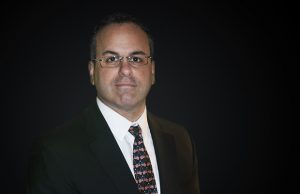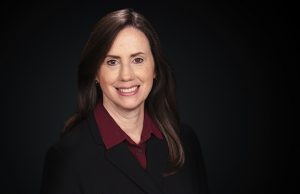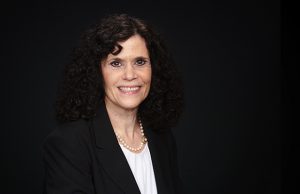The St. Francis School of Law criminal law faculty brings an impressive depth of criminal law skill and expertise to the St. Francis online classroom to fulfill the program’s mission of bringing students the highest quality practical lawyering training from exceptionally knowledgeable and experienced lawyers. Our criminal law faculty at St. Francis includes both state and federal prosecutors, as well as experienced criminal defense attorneys, bringing a wide variety of legal perspectives to the St. Francis Juris Doctor program. Because the St. Francis mission focuses on practical lawyering, the program brings St. Francis students together lawyers with in-depth practical legal capability, many with substantial teaching expertise as well.
 St. Francis Prof. Adam Lippe is a career prosecutor and the Chief of the Economic | Cyber Crimes Unit for the Baltimore County State’s Attorney’s Office, (a jurisdiction of over 800,000 people). In this role he manages direct reports and personally works on complex embezzlements and frauds, including identity theft, internet scams, check and credit card frauds, large material thefts, organized retail crime, financial exploitation of vulnerable adults, entitlement fraud, and animal cruelty, in addition to handling murders. He was a district and juvenile court prosecutor, before heading to violent crime and narcotics for many years before his current position. Prof. Lippe formerly served as a Special Assistant United States Attorney in the U.S. Attorneys’ Office in the District of Maryland. Prof. Lippe has been an adjunct faculty member at St. Francis School of Law, as well as both the University of Maryland School of Law and University of Baltimore School of Law and several other local colleges and universities helping to teach undergraduate and graduates both on-campus and online. Prof. Lippe also was a frequent lecturer at the National Advocacy Center in Columbia, South Carolina for the National District Attorney’s Association. Licensed in both the state of Maryland and New Jersey, Mr. Lippe is an alumni of the University of Maryland School of Law and The Johns Hopkins University in Baltimore, Maryland. Prof. Lippe helped to develop the criminal law and criminal procedure curriculum at St. Francis as well as the trial advocacy curriculum.
St. Francis Prof. Adam Lippe is a career prosecutor and the Chief of the Economic | Cyber Crimes Unit for the Baltimore County State’s Attorney’s Office, (a jurisdiction of over 800,000 people). In this role he manages direct reports and personally works on complex embezzlements and frauds, including identity theft, internet scams, check and credit card frauds, large material thefts, organized retail crime, financial exploitation of vulnerable adults, entitlement fraud, and animal cruelty, in addition to handling murders. He was a district and juvenile court prosecutor, before heading to violent crime and narcotics for many years before his current position. Prof. Lippe formerly served as a Special Assistant United States Attorney in the U.S. Attorneys’ Office in the District of Maryland. Prof. Lippe has been an adjunct faculty member at St. Francis School of Law, as well as both the University of Maryland School of Law and University of Baltimore School of Law and several other local colleges and universities helping to teach undergraduate and graduates both on-campus and online. Prof. Lippe also was a frequent lecturer at the National Advocacy Center in Columbia, South Carolina for the National District Attorney’s Association. Licensed in both the state of Maryland and New Jersey, Mr. Lippe is an alumni of the University of Maryland School of Law and The Johns Hopkins University in Baltimore, Maryland. Prof. Lippe helped to develop the criminal law and criminal procedure curriculum at St. Francis as well as the trial advocacy curriculum.
 St. Francis Dean Carole J. Buckner, a former federal prosecutor in the United States Attorneys Office for the Central District of California, also teaches criminal law. Dean Buckner served as a Special Assistant United States Attorney and prosecuted white collar criminal matters throughout Southern California, and received a commendation from the FBI director for her work involving a complex bank fraud scheme. She has extensive experience presenting indictments to federal grand juries, and has prosecuted a wide variety of postal crimes, as well as identity theft, bank fraud, theft crimes, false statements, corruption, conspiracy, and healthcare fraud. Dean Buckner has worked closely with federal law enforcement agencies including the FBI, USPS OIG, and the Postal Inspectors in conducting criminal investigations, and provided training for federal law enforcement personnel. Dean Buckner holds her JD from Hastings College of the Law, and her BA from the University of California, Berkeley. In the St. Francis online classroom, Dean Buckner helps students develop their understanding of the perspectives and concerns of prosecutors as well as defense counsel, guiding them in developing the arguments and counterarguments relevant to charges and convictions as St. Francis students master substantive criminal law while examining these concepts in connection with recent newsworthy cases.
St. Francis Dean Carole J. Buckner, a former federal prosecutor in the United States Attorneys Office for the Central District of California, also teaches criminal law. Dean Buckner served as a Special Assistant United States Attorney and prosecuted white collar criminal matters throughout Southern California, and received a commendation from the FBI director for her work involving a complex bank fraud scheme. She has extensive experience presenting indictments to federal grand juries, and has prosecuted a wide variety of postal crimes, as well as identity theft, bank fraud, theft crimes, false statements, corruption, conspiracy, and healthcare fraud. Dean Buckner has worked closely with federal law enforcement agencies including the FBI, USPS OIG, and the Postal Inspectors in conducting criminal investigations, and provided training for federal law enforcement personnel. Dean Buckner holds her JD from Hastings College of the Law, and her BA from the University of California, Berkeley. In the St. Francis online classroom, Dean Buckner helps students develop their understanding of the perspectives and concerns of prosecutors as well as defense counsel, guiding them in developing the arguments and counterarguments relevant to charges and convictions as St. Francis students master substantive criminal law while examining these concepts in connection with recent newsworthy cases.
St. Francis Professor Ryann Jorban, a career state prosecutor in Los Angeles, California, with over 15 years of experience, teaches criminal law and evidence, and also has worked with first year St. Francis students preparing for the First Year Law Students Exam. She earned her Juris Doctor degree from the University of Michigan, and her BA from the University of California, Riverside. She has spent the majority of her career working on cases involving special victims including child physical and sexual abuse survivors, male and female victims of domestic violence, and crime victims with developmental and physical disabilities. She has tried felonies ranging from homicide to fraud to child exploitation. She has provided training to law enforcement, sexual assault counselors, community members and other prosecutors on legal issues, trial techniques and working with the victims of crimes. As an educator she has served as a Professor of Criminal Justice for University of Phoenix both online and on-ground since 2001 teaching thousands of students the basics of criminal law and procedure. Prof. Jorban brings her real-world knowledge into the St. Francis classroom and will guide students in the upcoming term in the study of crimes including conspiracy, arson, burglary, robbery and larceny.
 St. Francis Professor Karen Travis also teaches criminal law and guides students in preparing for the First Year Law Students Exam. Prof. Travis practiced criminal law in Southern California handling juvenile and adult cases involving everything from infractions to felonies, including defending several felony murder cases. Prof. Travis also practiced criminal appellate law, and was successful in obtaining a resentencing for a client convicted of attempted murder on a gang-accomplice theory at age 16. Prof. Travis brings her criminal defense perspective to St. Francis students, particularly in the area of homicide. Prof. Travis earned her Juris Doctor degree from the University of Southern California, and holds a Masters from City University of New York, Queens College, and a B.S. from the State University of New York, at Albany.
St. Francis Professor Karen Travis also teaches criminal law and guides students in preparing for the First Year Law Students Exam. Prof. Travis practiced criminal law in Southern California handling juvenile and adult cases involving everything from infractions to felonies, including defending several felony murder cases. Prof. Travis also practiced criminal appellate law, and was successful in obtaining a resentencing for a client convicted of attempted murder on a gang-accomplice theory at age 16. Prof. Travis brings her criminal defense perspective to St. Francis students, particularly in the area of homicide. Prof. Travis earned her Juris Doctor degree from the University of Southern California, and holds a Masters from City University of New York, Queens College, and a B.S. from the State University of New York, at Albany.
Upper level St. Francis students also have the benefit of two distinguished lawyers in the classroom who are teaching criminal procedure this term. St. Francis Professor Raymond Chaoworked as a prosecutor in Chicago, where he tried over 250 significant contested trials involving sexual abuse, physical abuse, homicide, aggravated battery, home invasion, burglary, and other crimes. Prof. Chao also handled appeals, and conducted training for attorneys and law clerks. He holds his Juris Doctor degree from Loyola University School of Law, where he also earned an L. L. M, in Child and Family Law. Prof. Chao is a talented and experienced teacher as well, and has taught criminal law, criminal procedure and evidence, and worked with students studying for the First Year Law Students’ Exam. Prof. Chao also helped develop the criminal law curriculum at St. Francis. This term he is teaching criminal procedure, covering the constitutional rights of criminal defendants under the Fourth, Fifth, and Sixth Amendments of the United States Constitution.
St. Francis Prof. Jeff Price has recently joined the faculty at St. Francis, and he is also teaching criminal procedure this term. Professor Price has handled criminal law and civil rights matters in both Oregon and California and currently practices in Santa Monica, California. He has practiced criminal law since 1989, including both trial and appellate work, and both federal and state cases. Professor Price also is a California State Bar Certified Appellate Specialist. Prof. Price is a graduate of the University of California, Berkeley, and holds his JD from the University of Oregon. He brings a real world perspective to the classroom, with over 30 jury trials as well as oral appellate arguments before the Ninth Circuit United States Court of Appeals. In the criminal procedure class, Prof. Price shares his wide-ranging expertise in the court room and before the appellate court with St. Francis students.
These highly skilled criminal lawyers elevate the St. Francis criminal law curriculum beyond the casebook and into the courtroom and the headlines, surpassing the standard “academic” approach. In the St. Francis classroom, highly experienced lawyers convey to St. Francis students what it means to practice criminal law: the challenges of crafting arguments both for the government and also for criminal defendants, what it really means to take a criminal case to the jury in a court room, the practical reality of arguing criminal law issues before a judge at the trial or appellate level, the challenges of representing criminal defendants, and the importance of the United States Constitution in criminal practice, as well as and what it takes for the state or federal government to prove a case beyond a reasonable doubt. The St. Francis criminal law faculty members deliver on the program’s core educational mission.
